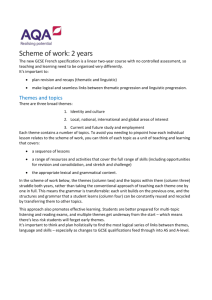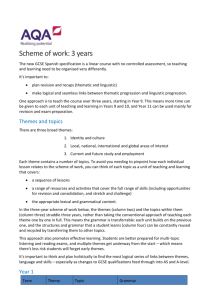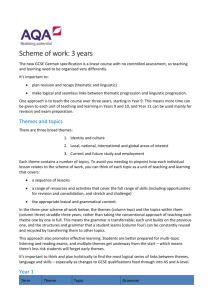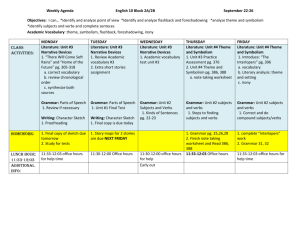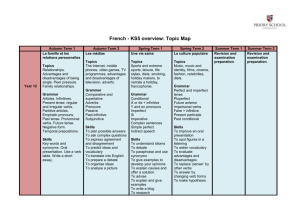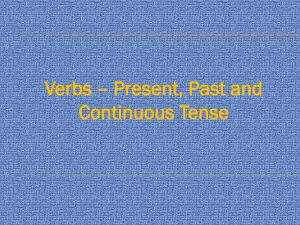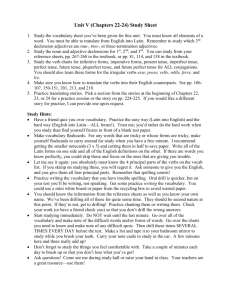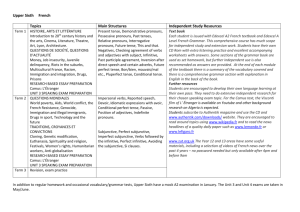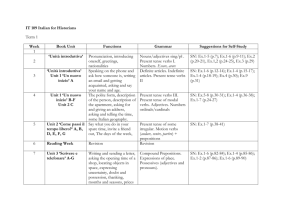Scheme of work (3 years)
advertisement
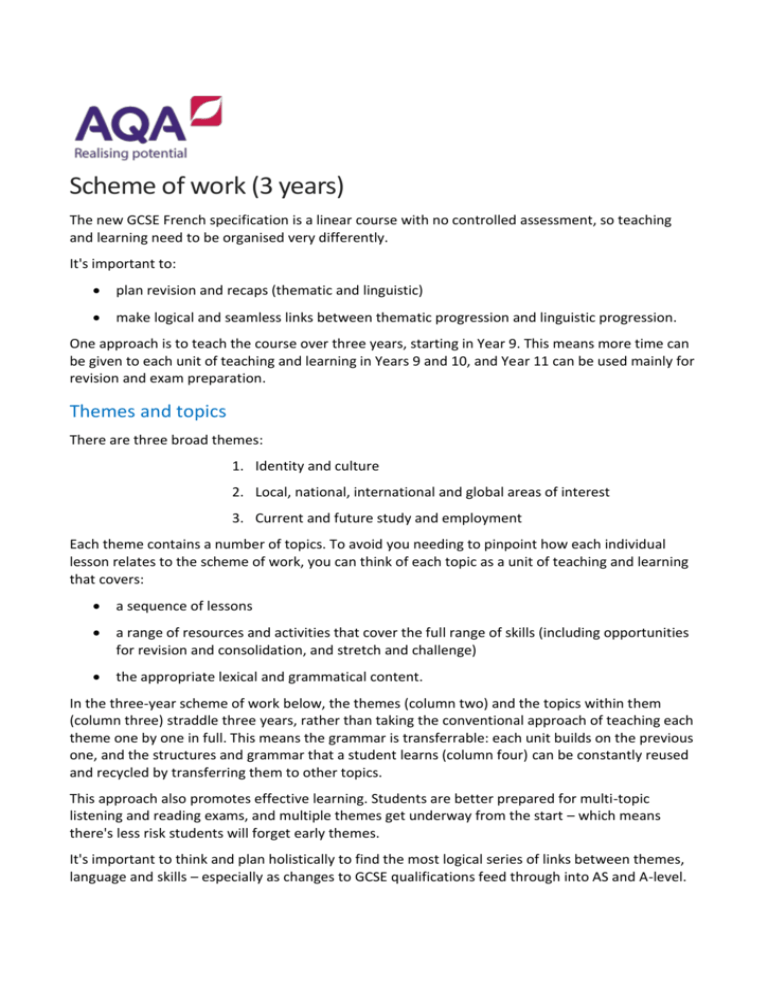
Scheme of work (3 years) The new GCSE French specification is a linear course with no controlled assessment, so teaching and learning need to be organised very differently. It's important to: plan revision and recaps (thematic and linguistic) make logical and seamless links between thematic progression and linguistic progression. One approach is to teach the course over three years, starting in Year 9. This means more time can be given to each unit of teaching and learning in Years 9 and 10, and Year 11 can be used mainly for revision and exam preparation. Themes and topics There are three broad themes: 1. Identity and culture 2. Local, national, international and global areas of interest 3. Current and future study and employment Each theme contains a number of topics. To avoid you needing to pinpoint how each individual lesson relates to the scheme of work, you can think of each topic as a unit of teaching and learning that covers: a sequence of lessons a range of resources and activities that cover the full range of skills (including opportunities for revision and consolidation, and stretch and challenge) the appropriate lexical and grammatical content. In the three-year scheme of work below, the themes (column two) and the topics within them (column three) straddle three years, rather than taking the conventional approach of teaching each theme one by one in full. This means the grammar is transferrable: each unit builds on the previous one, and the structures and grammar that a student learns (column four) can be constantly reused and recycled by transferring them to other topics. This approach also promotes effective learning. Students are better prepared for multi-topic listening and reading exams, and multiple themes get underway from the start – which means there's less risk students will forget early themes. It's important to think and plan holistically to find the most logical series of links between themes, language and skills – especially as changes to GCSE qualifications feed through into AS and A-level. Year 1 Term Theme Topic Autumn half-term 1 Identity and culture Me, my family and friends Autumn half-term 2 Grammar Relationships with family and friends Local, national, Home, town, international neighbourhood and region and global areas of interest avoir and être present tense possessive adjectives adjective agreement rules reflexive verbs se disputer/se fâcher/s’entendre avec comparatives plus que/moins que adverbs of frequency regular verbs in present tense direct object pronouns il y a on a c’est prepositions (see resources: Teaching notes and Slides) plural partitive article and de after negative pouvoir + infinitive (see resources: Teaching notes and Team game) expressions of quantity irregular verbs aller/faire (see resources: Teaching notes and Presentation) ceux qui + verb s’intéresser à enhancing descriptions using qui/que/dont (see resources: Presentation) Term Spring halfterm 1 Spring halfterm 2 Summer Theme Current and future study and employment Identity and culture Identity and Topic Grammar My studies Free-time activities Music Cinema and TV Free-time activities demonstrative adjectives ce, cet, cette, ces devoir + infinitive (see resources: Teaching notes and Presentation) il faut + infinitive (compulsory subjects) parce que/car to express reasons perfect tense regular avoir verbs (choisir/décider de/laisser tomber - options ) (see resources: Teaching notes and Presentation) two verbs together eg aimer/aimer mieux/ préférer comparative and superlative in expressing opinions about subjects (see resources: Teaching notes and Presentation) use of tu and vous in informal/formal exchanges consolidation of present tense including irregular verbs sortir, prendre, mettre, voir, vouloir (see resources: Worksheet) extend range of two verbs together adverbs such as d’habitude/normalement clauses introduced by quand/lorsque and si perfect tense with avoir Term half-term 1 Summer half-term 2 Theme culture Identity and culture Topic Food and eating out Sport Customs and festivals in French-speaking countries/communities Grammar using regular and common irregular verbs (ce que j’ai fait hier soir/le weekend dernier) (see resources: Worksheet) simple opinion statements to express how it was (illustration of the imperfect) perfect of verbs with être + agreement rules (see resources: Worksheet) reflexive verbs in perfect; perfect and imperfect tenses together describing a past event/festival; actions and opinions Year 2 Term Theme Autumn half-term 1 Current and Life at school/college future study and employment Autumn half-term 2 Local, national, international and global areas of interest Topic Travel and tourism Grammar transfer devoir/pouvoir/il faut/vouloir to school rules context (see resources: Teaching notes) quantity words beaucoup/trop/assez/pas assez + de (including with plurals) consolidation of perfect tense extension of imperfect tense (see resources: Teaching notes, Presentation and Practice) sequencing words, expressions and phrases avant de/après avoir Term Theme Topic Grammar etc/pendant que/depuis/venir de Spring halfterm 1 Spring halfterm 2 Summer half-term 1 Current and Education post-16 future study and employment Local, national, international and global areas of interest Identity and culture Social issues Healthy/unhealthy living Marriage/partnership developing greater complexity in spoken and written accounts of past events or experiences weather expressions with faire ce qui/ce que… c’est… sentence pattern future tense introduced for eg future study plans building on si clauses with present and future more complex two verb structures (avoir l’intention de/avoir envie de/avoir le droit de) partitive articles with food items recap on devoir/il faut and introduce conditional forms – affirmative and negative il vaut mieux/il vaudrait mieux negative ne…jamais full explanation of imperfect tense to allow statements and opinions about previous health habits revisiting adjectives to describe and use of qui, que, dont to describe ideal partner and enhance descriptions en + present participle Term Summer half-term 2 Theme Identity and culture Topic Grammar Technology in everyday life Social media Mobile technology revision of future tense to outline future plans direct and indirect object pronouns revision of past tenses to recount how social media have been used; or life before technology grâce à/sans/avec enhanced statements of possibility including permettre de il est possible que + subjunctive Year 3 Term Theme Topic Autumn half-term 1 Local, national, international and global areas of interest Global issues Autumn half-term 2 Spring halfterm 1 Grammar Social issues Local, national, international and global areas of interest Global issues modal verbs linked to behaviours (must do/can do/should do/could do etc) si clauses using imperfect and conditional si sentences revised for outlining consequences of actions vouloir + infinitive vouloir que + subjunctive il est possible que + subjunctive si j’étais… à la place de… with conditional completions il faut + infinitive and il faut que + subjunctive The environment Local, national, international and global areas of interest Charity/voluntary work Homelessness/ poverty Term Theme Topic Spring halfterm 2 Current and Career choices and future study and ambitions employment Summer half-term 1 End of course examination focus Summer half-term 2 End of course examination focus Grammar enhanced statements of possibility including permettre de pluperfect tense perspective Differentiation The grammar progression above might be over-demanding for some students. For each language point and grammar area, you'll need to decide the appropriate scope for each group of students – for example, you might need to be selective about teaching modal verbs (je peux, on peut…) if the full conjugation proves too demanding. Similarly, very able students need to be stretched and challenged. This scheme of work is not prescriptive: it's a programme that you can use to find the level that's right for your students.
